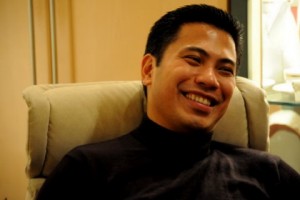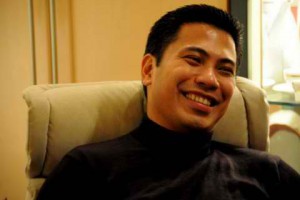By PABLO TARIMAN
 A FILIPINO baritone based in Berlin is now considered one of the world’s most versatile interpreters of contemporary music in the German opera scene after appearing in an important segment of a contemporary opera by acclaimed composer Karlheinz Stockhausen last April 9 and 10 at the Cologne Opera in Germany.
A FILIPINO baritone based in Berlin is now considered one of the world’s most versatile interpreters of contemporary music in the German opera scene after appearing in an important segment of a contemporary opera by acclaimed composer Karlheinz Stockhausen last April 9 and 10 at the Cologne Opera in Germany.
Jonathan Zaens appeared in the opera “Sonntag aus Licht” by Stockhausen, who is considered by opera critics as one of the most important composers of the 20th and early 21st centuries and “one of the great visionaries of 20th-century music.”
Zaens was a prizewinner of the 7th Sylvia Geszty International Voice Competition, as well as a finalist at the Bach International Competition and the Mendelssohn Voice Competition.
After finishing his studies in voice/music theater at the University of the Arts in Berlin, he was heard at the Prague State Opera singing the Mozart roles of Leporello and Guglielmo. He also had guest appearances at the Berliner Chamber Opera and other opera houses in Germany.
Zaens earlier figured in the world premiere of Stockhausen’s “Duffe Zeichen” (Scents-Signs) at the 2003 Salzburg Festival, making him the third Filipino singer to invade said festival after soprano Evelyn Mandac and tenor Otoniel Gonzaga.
The Cologne Opera production of the Stockhausen opera was conceptualized and directed by the famous Spanish group, La Fura des Baus, which is known for spectacular productions.
Journalist Ismael Jose Gonzalez Cabral of the Spanish Post recently interviewed Zaens on his insights and experience with Stockhausen and his music. In the interview, Zaens said his first encounter with the controversial German composer’s music was shortly after finishing his studies at the Academy for the Arts in Berlin (Hochschule der Künste).
He was then offered the bass role in “Michaels Jugend” from “Donnerstag aus Licht” in a production for the MaerzMusik Festival 2002 in Berlin.
Zaens confided to the Spanish press: “I may have done works before of contemporary composers like Frank Martin and Judith Weirr in small student recitals in the Academy, but Stockhausen was my first hardcore, large scale contemporary work.”
“I was such a neophyte in this genre at that time, that it took me almost a year to learn my part in ‘Michaels Jugend’,” he added. “But that paid off because I got a personal telephone call from Stockhausen after our Berliner Premiere, engaging me to sing the baritone part in ‘Dufte Zeichen’ for the Salzburger Festspiele.”
The Filipino baritone also admitted his first telephone encounter with Stockhausen was also one of the most embarrassing moments in his life.
He explained: “When Mr. Stockhausen called, he introduced himself only as Stockhausen. I thought it was a friend making a joke on me. I asked backed in a mischievous and almost irreverent tone: ‘Do you mean Karlheinz Stockhausen?’ using the informal form of YOU in German. The moment he confirmed it, I suddenly realized that he was the real one!”
In the same interview, Zaens complimented the German composer for his sensitivity to the human voice. He said: “He had a natural instinct and the knowledge as to how this human instrument functions and of its capabilities and limitations. I bet he sang what he wrote himself!”
As a result, Zaens observed that Stockhausen’s vocal lines are always “singable” in spite of different levels of difficulties. He added that unlike some other contemporary composers, Stockhausen doesn’t demand vocal acrobatics which are impossible to sing and to some extent, would even do damage to the voice.
“In that famous telephone conversation, I remember him asking specifically how high I can sing as a bass-baritone, while he was working on the part for ‘Dufte Zeichen’,” Zaens recalled. “I told him it depends on how I get there. When the score came and I started learning my part, I was so happy and actually relieved to see that my vocal line was manageable, that it was well-thought of, that it was singer-friendly and that he carefully took into consideration my vocal capability as well as limitation.”
Judging from the highly positive reviews of the baritone’s lied and oratorio engagements, it is easy to see that Zaens had become the “Prince of Lied and Oratorio from the Philippines.”
He has also recorded the CD, “Kundiman—Philippine Art Songs” accompanied by pianist Abelardo Galang II, who is also based in Berlin. Produced by Sundro Keller and recorded in St. Paulus Germende Grosser Saal in Berlin, the CD features kundiman compositions of Nicanor Abelardo, Francisco Santiago, Mike Velarde Jr. and Resurreccion Bunyi.
